Death and Dying
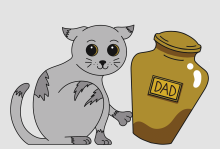
A WILL IS an important document that protects your family and ensures financial security for children who have yet to pay back the 300 grand you spent on each of them growing up. You definitely should not wait until you’re 73 to write one. In my case, I was waiting for the wisdom that comes with age. Failing that, I was also waiting for the lawyer we chose to grow up and go to law school. Because, when we first met him, I thought he was a teenager.
It’s like when I go to the doctor these days and she looks like she’s just been dropped off at soccer practice by her mom. Nothing like the white-haired doctor who used to frighten me with dire predictions of the health problems that every aging man confronts. But now that all those predictions have come true for me, I need to make my will.
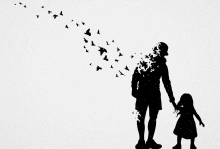
MY FATHER TOOK his last breath on April 2, 2024, in his home in Southern California. My sister, my aunt, and I were present. He was 68.
Just days before, we were considering chemotherapy. But the illness had already swung into high gear, and his body shut down quickly. The day before my dad’s first chemo appointment, he died.
My dad was a complicated man who kept many secrets. He had written “Metastatic Stage IV Colon Cancer” in a notebook in mid-February, over a week before he told any of us how far the cancer had spread. In his final weeks, he began to relinquish independence and control, starting with giving me durable power of attorney over his affairs just an hour before he went into surgery to remove the tumor in his colon. Up until then, he didn’t want to sign the papers.

As of April 15, more than 101,000 people worldwide have died of the novel coronavirus. In the U.S., 42 states, the District of Columbia, and Puerto Rico have issued orders for people to stay in their homes to slow the spread. But with at least 1.6 million infected globally, the mortality rate has forced an increasing number of people to confront a topic they tend to otherwise avoid: death.
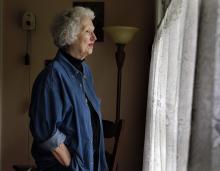
Her once boundless energy starts to fail by midday. She started radiation treatment on May 21, mainly in an effort to forestall the possible collapse of her spine, which would leave her helpless and in intractable pain.
“That sounds a little formidable to me,” she says.
“I was never much for suffering.”
She goes on, her words carefully chosen. “Am I grateful for this? Not exactly. But I’m not unhappy about it. And that’s very difficult for people to understand.”
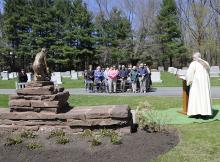
None of the remains of the 26 babies — miscarried, stillborn, and short-lived — whose names are engraved on paving stones or metal butterflies at the Remembrance Garden are actually interred there. But to the families who gathered at the memorial last month, the plot is sacred ground.
“The garden says to us: You matter,” Biskup told them.
“Your baby existed. He or she matters. We remember.”

One summer my cousin Betty and I sneaked through the barbed-wire fence of a neighbor’s orchard and ate so many wild plums right off the tree that we almost made ourselves sick. Betty was 13 and I was 9, and I adored her. I still do.
Betty is dying right now. She might not make it till Christmas, which is really bad timing in my opinion. Yes, I talk with God about this. It’s one thing for me to lose a beloved cousin: I’m old enough to know from experience that, while the pain can feel like a raw wound that might never heal, losing those we love is a normal part of life. But I keep wondering, What kind of message is God sending to Betty’s family by jerking her away from them during this holy season of Advent? Doesn’t God care that they are already plunged into grief in anticipation of losing someone they love so much?
Yes, I talk with God about my fears, too, mostly in the form of questions from the little five-year-old kid inside me. What’s going to happen? Where are we going? What will it be like? Will it hurt? Do I have to? And, Why?
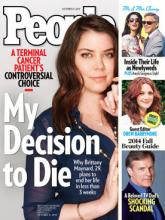
Brittany Maynard’s decision to die soon by a legal, lethal prescription, rather than let a brain tumor kill her, has provoked a national conversation and debate about end-of-life decisions.
In a new video, released Oct. 29, she says she feels herself getting sicker by the day. But since she still feels joy in living, she’ll postpone her day of death past the date originally announced — Nov. 1.
Maynard, 29, has inspired raging arguments about the values, even about the vocabulary, underlying the choices we make about our last days. Her goal, she still says, is to “influence this policy (on physician-assisted dying) for positive change.”
As ethicists, activists and religious voices square off, here are five things to know about death and dying.
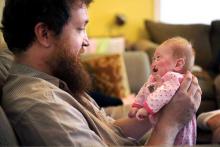
NASHVILLE, Tenn. -- Eric and Ruth Brown believe nothing about daughter Pearl Joy's life is a mistake.
They say God gave Pearl her bright red hair and wide blue eyes, as well as the genetic disorder that created a cleft in her upper lip and caused her brain's development to stall in the first weeks in the womb.
"Things didn't go wrong," Eric Brown said. "God has designed Pearl the way he wanted, for his glory and our good."
That belief has sustained the Browns during the past six months, ever since a routine ultrasound revealed that the couple's third child has alobar holoprosencephaly, a rare genetic condition that's almost always fatal. A specialist told the Browns she would probably die in the womb and advised them to end the pregnancy early.
It's one thing to talk about God's will when life is good. It's another when a doctor is saying your baby won't live.
The Browns were forced to consider religious, medical and ethical issues most parents never will. And nobody could make their decision for them.
The Browns never considered abortion. They believe that Pearl is "fearfully and wonderfully made," as Psalm 139 puts it, and God alone should decide when she lives and when she dies.
Seeing Pearl's beating heart on the ultrasound also persuaded them to continue the pregnancy, even if the odds were stacked against her.
"If there is a chance, you say yes to that chance," Eric Brown said. "The only thing I know about parenting is that you say yes."
So far, Pearl has beaten the odds.
Few babies with Pearl's disorder make it to term, and of those who do, only 3 percent survive birth, according to the Dallas-based Carter Centers for Brain Research in Holoprosencephaly and Related Malformations. Pearl has a particularly severe form of the condition, which means her brain never divided into two hemispheres.
She turned 11 weeks old Oct. 12, a milestone that the Browns celebrated by lighting 11 candles and singing "Happy Birthday."
One man searches for balance between family and solitude, nature and technology.
I very much appreciated “The Art of Dying” by Lisa Sowle Cahill (June 2010).
In her generally fine article, Lisa Sowle Cahill states, “euthanasia or physician-assisted suicide is not an acceptable answer to the stress of human death.”

Is a proper burial for World Trade Center victims a justice issue? Diane Horning's vigil for the conscience of America.
In Ceremonies of the Seasons, Jennifer Cole writes, “All calendars are founded upon a wish to organize our experience of time into manageable units—especially the year, with i
Making caskets is fine. But who's going to clean up this mess? Inside their light, fragrant workshop, a handful of monks are hard at work. They're planing. They're ripping.
